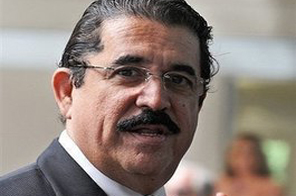US cuts aid to Honduras
WASHINGTON: The Obama administration on Thursday cut off around 30 million dollars in aid to Honduras in a bid to press coup leaders to accept a Costa Rican proposal to restore ousted president Manuel Zelaya.
"Today's action sends a clear message to the de facto regime that the status quo is unacceptable," State Department spokesman PJ Crowley told reporters after Secretary of State Hillary Clinton decided on the cut-off.
In Tegucigalpa, the de facto leaders of Honduras decried the move as "not very friendly" and accused the US of siding with Venezuelan President Hugo Chavez, who has also sought to isolate their new regime.
"We regret that a friendly government of a friendly country and people would take the decision to side with Chavez," said the head of Honduran cabinet, Rafael Pineda Ponce.
Zelaya, who met with Clinton on Thursday in Washington, welcomed the US decision and said the coup leaders who ousted him on June 28 were becoming increasingly isolated.
"With this decision of the United States, the countries of the Americas have formed a single bloc in condemning the coup," Zelaya said.
Clinton sees a "need for strong measures" against the de facto regime until it accepts Costa Rican mediation to end the crisis and restores democratic order, her spokesman Ian Kelly said.
The US had warned it was prepared to take further measures after already halting most visa services in Honduras, revoking visas for the interim regime and suspending 35 million dollars in military and development aid.
Crowley, the assistant secretary of state for public affairs, said Clinton's decision meant that some 30 million dollars in aid that had been previously suspended was now "terminated."
These funds included aid for development assistance and money intended to help the country boost foreign trade, US officials later told reporters on condition of anonymity.
The State Department stopped short of formally declaring the June 28 events a military coup.
A State Department official, speaking last month on condition of anonymity, said the US was looking at cutting off aid through the Millennium Challenge Corporation, which rewards nations with free economies and political systems.
Honduras in 2005 signed a five-year, 215 million-dollar deal with the US government-funded corporation to boost agriculture and transportation.
The funds are helping to widen and upgrade the Central American nation's principal highway, the CA-5, a project the corporation says will benefit hundreds of thousands of Hondurans.
According to the latest quarterly report, some 80.3 million dollars has been disbursed, meaning that the US government could still block some 135 million dollars from going towards the project.
Restoring the terminated aid will depend on "a return to democratic, constitutional governance in Honduras," Clinton's spokesman Kelly said.
Under a proposal drawn up by Costa Rican President Oscar Arias, Zelaya would return to power but new elections would be held promptly and those who participated in the coup would enjoy an amnesty.
Zelaya accepts the proposal but Honduras interim leader Roberto Micheletti does not.
Crowley said it was "unacceptable" for the coup leaders to try to "run out the clock" on Zelaya's term by stalling for time until a presidential election takes place in November.
Kelly's statement said "at this moment, we would not be able to support the outcome of the scheduled elections," which it said must be undertaken "in a free, fair and transparent manner" as well as open to all Hondurans.
"A positive conclusion of the Arias process would provide a sound basis for legitimate elections to proceed. We strongly urge all parties to the San Jose talks to move expeditiously to agreement."






